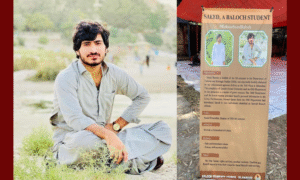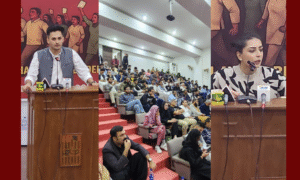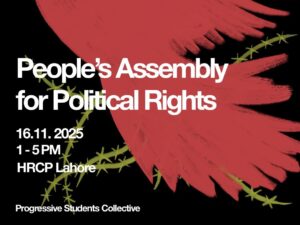Maryam Mirza
There is a strange melancholy in reminiscing about Zia ul Haq’s era. Strange because I, as a mind and body, have not lived through it – yet the historical memory of the dictatorial regime remains omnipresent in almost every facet of the Pakistani experience – including the country’s artistic evolution. Despite massive wide scale suppression of resistant voices, the amount of literary, intellectual and artistic work that has recorded rebellion and censorship during the Zia era is unparalleled to another period in Pakistan’s history. Despite state active efforts to shun critical speech, it was through the words of brave and revolutionary writers that today the modern citizen recognises his governance as a crucial turning point in the country’s politics and social life.
Zia’s coming into power as a dictator came with nation-wide state exercise to censor the textual, visual and performing arts. Literary and poetic works had been allowed for publishing but with a hollowed silence on political ideologue and critical commentary. This was to further the social, legal and institutional program of ‘Islamization’. It presented a choking point in the public careers of many musical and dance artists. Meanwhile, in prominent literary circles, state censorship instead strengthened written and vocal opposition. As some of the country’s authors and poets championed the voice of dissent against the regime, many were fated to legal imprisonment and even exile. Despite this, poetry was not to remain silenced. The spirited environment surrounding the poetic front at the time is better captured by Zahoor Hussain Zahoor’s (translated) words: “to remain silent is to die.”
However, the purpose of writing here is not to present a case of the Zia-led regime’s censorship exercises, but to present the emotionality, frustration and resilience of the resistance movement through the works of Pakistan’s most celebrated poets: Habib Jalib, Faiz Ahmed Faiz, Fahmida Riaz and Kishwar Naheed.
Habib Jalib
Habib Jalib, was reputed as a revolutionary left-wing, populist poet and skilfully captured society’s sentiment and rejection of the country’s repeated dictatorships. He invested his poetic and melodious works in resisting martial law and military regimes repeatedly. Rightfully deemed the people’s poet, as a welcome to Zia ul Haq, he wrote:
“Sar sar ko saba, zulmat ko Zia
bande ko khuda kya likhna”
“(How can I describe darkness as light,
a storm as a zephyr or a man as God?)”
Here he is seen to be rejecting Zia’s leadership as divine providence, instead likening the military regime to a dark episode in the country’s history.
Further, he wrote and performed a more elaborate piece titled “Hukmaran hogaye…” to highlight the problems of elite networks close to the regime and resulting corruption that had stripped away the political and economic rights of common citizens:
“Low minded wretches have become our rulers
Good people have been trampled into the dust
Every patriot has been heaped with disgrace
The darkness of night has gone on and on
Those who sing the praise of dictators
They are the ones promoted and praised…”
Faiz Ahmed Faiz
A Marxist-communist author and poet and particularly famous for his nazam “Hum Dekheinge”, Faiz Ahmed Faiz is a household name amid both Pakistanis and Indians as his literary career preceded the 1947 Partition. This particular work is his most prominent expression of resisting state power and instilling a sense of hope among the common people. His words are sung across South Asians even today, expressive of their hope for a better future.
“…When from this God’s earth
All falseness (icons) will be removed
Then we of clean hearts – who have been barred out of sacred places
We, will be invited to that altar to sit and Govern-
When crowns will be thrown off- and over turned will be thrones
We shall see
Certainly we, too, shall see
that day that has been promised to us…”
Here, Faiz is seen to be reclaiming the country’s religious narrative to speak for the masses. In promising a time when the Pakistani people will be free of tyrannical rulers and political agendas, he is seen to be doing away with heavy-handed state authority altogether.
While Faiz did not remain alive to witness the end of the Zia regime, his legacy has lived on as exemplary in performances like those of Pakistan’s famous female ghazal singer Iqbal Bano, who clad herself in a black saree and sang Faiz’s revolutionary words in front of an audience of 50,000 in Lahore – a powerful gesture of outright defiance of the incumbent regime.
Fahmida Riaz
On account of powerful women in Pakistan, a retelling of the anti-Zia resistance movement is incomplete without regarding the contribution of literary feminists. As is often overlooked, one of the first public displays of protest to Zia’s leadership and oppressive and gendered legal reform was led by female activists, the likes of which include reputed poets Kishwar Naheed and Fahmida Riaz. The latter grieves in her poem “Chaadar aur Chaardivari” at the staunch policing of women’s public lives under the new government:
“Sire! What will I do with this black chaadar
Why do you bless me with it?
I am neither in mourning that I should wear it
To announce my grief to the world
Nor am I a disease, that I should drown, humiliated, in its darkness
I am neither sinner nor criminal
That I should set its black seal
On my forehead under all circumstances.”
Here Riaz is critical of the religious orthodoxy that has mandated women’s visibility and movement in public life and taken away civilian freedom in personal matters such as veiling.
Kishwar Naheed
Her counterpart, Kishwar Naheed, is also exemplary in the way Pakistan’s feminists have used poetry as an expression of dissent. In her famous poem, “Hum Gunahgaar Aurtein”, she beautifully taunts at the patriarchal regime and challenges the popular image of the weak, subordinate Pakistani woman:
“It is we sinful women
Who are not intimidated
By the magnificence of those who wear robes
Who don’t sell their souls
Don’t bow their heads
Don’t fold their hands in supplication
We are the sinful ones…”
The Resistance Lives On…
Of these four incredibly dynamic and revolutionary poets equipped with great power to create relatability, only Naheed remains among us to tell the tales of rebellion and silencing from an era decades past but increasingly important even in today’s political climate. A year ago, I had the humbling experience to listen to her recite the incredibly moving words of her poem above to a live audience. Her tone was an energetic anguish accompanied by a smile – telling of the unbroken spirit of the artist in times of resistance.
The Students’ Herald News Desk focuses on reporting the latest news regarding student politics and campus updates to you.
The News Desk can be reached at admin@thestudentsherald.com




